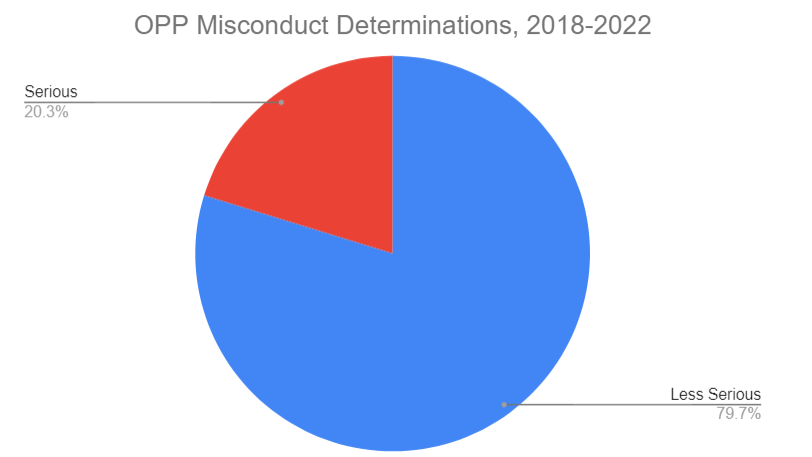Widow takes Ontario police to court over declaration misconduct in her husband's death was 'not serious'
A grieving widow is taking the Ontario Provincial Police to court as she challenges its decision to call the misconduct of an officer that contributed to her husband’s death “not of a serious nature” – a decision that denied her access to a public hearing in the case.
A CTV News investigation shows that the OPP has declared misconduct by its own officers not serious about 80 per cent of the time in the last five years, and sends identical paragraphs that don’t explain its reasoning in cases from neglect of duty to unlawful use of force.
Courtney D’Arthenay said she couldn’t believe she received a boilerplate letter informing her that the OPP would resolve her complaint without a hearing after an officer accidentally struck and killed her husband Tyler Dorzyk while speeding near Barrie in 2020.
“Going through life without Tyler is very difficult,” D'Arthenay said in an interview. “I’ve found it’s been getting worse with time and a huge part of that is due to the fact that I’m being told this isn’t serious. It’s not a big deal,” she said.
“I just don’t want someone else to be going through this when you’re already in a really horrible time. We can afford a little bit of respect and give people actual justification and reasons,” she said.
D’Arthenay launched a judicial review in Oshawa Superior Court last month, asking the court to declare the misconduct serious, which would allow her to participate in a disciplinary hearing, and widen the scope of possible disciplinary actions the officer, Const. Jaimee McBain, could receive.
It was only through the court application that they discovered the result of the disciplinary proceeding for McBain: non-disciplinary counselling, her application says.
Her lawyer, Justin Safayeni, said the OPP needs to explain its reasoning publicly.
“When you’re making that kind of consequential decision, the bare minimum that is required is a degree of transparency and explanation as to why you were making that decision. And we say that simply wasn’t provided in this case,” he said.
“Our concern is that the door was shut on that process in a way that was not explained. And we say that was not justifiable,” he said.
 Courtney D’Arthenay and her husband Tyler Dorzyk, who was struck and killed by an officer speeding near Barrie in 2020 (Supplied).Dorzyk died around midnight on September 28, 2020, when he and a friend were walking across Highway 12 at Jones Road in Midland, Ontario. He was travelling to the city for work and crossed against the light in the rain in the dark.
Courtney D’Arthenay and her husband Tyler Dorzyk, who was struck and killed by an officer speeding near Barrie in 2020 (Supplied).Dorzyk died around midnight on September 28, 2020, when he and a friend were walking across Highway 12 at Jones Road in Midland, Ontario. He was travelling to the city for work and crossed against the light in the rain in the dark.
An investigation found McBain was driving an unmarked SUV at the time, returning from getting coffee for another officer at a crime scene. She told investigators she didn’t see Dorzyk. She turned the vehicle around and tried to revive him.
McBain wasn’t charged criminally by the Special Investigations Unit, and the OPP didn’t press Highway Traffic Act charges. A photo from the SIU investigation shows a smashed windshield on the passenger’s side of the unmarked black SUV.
Another watchdog, the Office of the Independent Police Review Director (OIPRD) did find McBain committed discreditable conduct, saying she was speeding between 72 and 97 km/h, even though the speed limit had dropped from 80 km/h to 60 km/h in the run-up to the intersection, where Dorzyk was hit.
Questions from CTV News to Solicitor-General Michael Kerzner were referred to the OPP, which didn’t respond. The force has said in the past that the language of “not serious” is in the Police Services Act.
 A photo from the SIU investigation shows a smashed windshield on the passenger’s side of an unmarked black SUV.A freedom of information request shows that of 92 decisions from 2018 to 2022, 63 were declared “less serious” by the OPP, and 16 were declared “serious”. The OIPRD made a declaration in 13 cases.
A photo from the SIU investigation shows a smashed windshield on the passenger’s side of an unmarked black SUV.A freedom of information request shows that of 92 decisions from 2018 to 2022, 63 were declared “less serious” by the OPP, and 16 were declared “serious”. The OIPRD made a declaration in 13 cases.
That means that, when deciding on its own officers, the OPP declared misconduct not serious about 80 per cent of the time, the figures show.
CTV News also asked for several years’ worth of letters the OPP sent to complainants to inform them of the result in the case. In 20 letters, one paragraph was repeated verbatim. The paragraph reads:
“After careful consideration, on behalf of Commissioner Thomas Carrique, and in accordance with subsection 66(4) of the Police Services Act, it is my decision the misconduct was not of a serious nature and this matter can be addressed informally. In cases of substantiated misconduct I consider many mitigating and aggravating factors to determine the seriousness. These factors may include, but are not limited to: the public interest, intentions of the officer, consistency of dispositions, acknowledgement/remorse of the officer, any personal gain on behalf of the officer, a lack of understanding, the consequences/impact of the misconduct, employment history, deceit/dishonesty, duration of misconduct (single incident or protracted over time), rank and where the behaviour falls on the spectrum of misconduct. This does not in any way minimize the issue you have brought to our attention, but I feel this conduct can be managed without the necessity of holding a formal disciplinary hearing. Dealing with the matter informally includes a wide variety of possible corrective action and can involve such outcomes as but is not limited to: Non-disciplinary corrective discussion with the officers involved and training; Documentation in the officer’s personnel file; The loss of a number of paid hours from the officer involved; Or a combination of the above.”
 A CTV News investigation shows that the OPP has declared misconduct by its own officers not serious about 80 per cent of the time in the last five years. In one letter, the paragraph was repeated twice, for two officers. In two other letters, only part of that paragraph was written.
A CTV News investigation shows that the OPP has declared misconduct by its own officers not serious about 80 per cent of the time in the last five years. In one letter, the paragraph was repeated twice, for two officers. In two other letters, only part of that paragraph was written.
The letters do not include details of the incidents, but describe the findings of substantiated misconduct in cases of neglect of duty, discreditable conduct, and unlawful use of force.
The boilerplate nature of the paragraphs are concerning, said the Ontario NDP’s critic for the solicitor-general, John Vanthof.
“For these families, this is the most traumatic thing that is likely going to happen to them in their lives. To get a form letter is not sufficient,” he said.
That paragraph was contained in the letter to D’Arthenay, who says she hopes that her suit prompts the OPP to reconsider cutting her out of the disciplinary process, but also to update its policies and take seriously its obligation to explain its decisions.
"One would hope that a victory in this case would send the broader message that this type of decision making at the very least has to be accompanied by a set of reasons and an explanation that leaves the recipient of these decisions and these letters in a position to understand what happened, even if they don't agree with it," Safayeni said.
CTVNews.ca Top Stories

Ministers Joly, LeBlanc travel to Florida to meet with Trump's team
Two members of Prime Minister Justin Trudeau's cabinet will be in Palm Beach, Fla., Friday to meet with members of Donald Trump's team.
India alleges widespread trafficking of international students through Canada to U.S.
Indian law enforcement agencies say they are investigating alleged links between dozens of colleges in Canada and two 'entities' in Mumbai accused of illegally ferrying students across the Canada-United States border.
Teen actor Hudson Meek, who appeared in 'Baby Driver,' dies after falling from moving vehicle
Hudson Meek, the 16-year-old actor who appeared in 'Baby Driver,' died last week after falling from a moving vehicle in Vestavia Hills, Alabama, according to CNN affiliate WVTM.
Pizza deliverer in Florida charged with stabbing pregnant woman at motel after tip dispute
A pizza deliverer in central Florida has been charged with pushing her way into a motel room with an accomplice and stabbing a pregnant woman after a dispute over a tip, authorities said.
Unwanted gift card in your stocking? Don't let it go to waste
Gift cards can be a quick and easy present for those who don't know what to buy and offer the recipient a chance to pick out something nice for themselves, but sometimes they can still miss the mark.
Aviation experts say Russia's air defence fire likely caused Azerbaijan plane crash as nation mourns
Aviation experts said Thursday that Russian air defence fire was likely responsible for the Azerbaijani plane crash the day before that killed 38 people and left all 29 survivors injured.
Police identify victim of Christmas Day homicide in Hintonburg, charge suspect
The Ottawa Police Service says the victim who had been killed on Christmas Day in Hintonburg has been identified.
Cat food that caused bird-flu death of Oregon pet was distributed in B.C.: officials
Pet food contaminated with bird flu – which killed a house cat in Oregon – was distributed and sold in British Columbia, according to officials south of the border.
Raised in Sask. after his family fled Hungary, this man spent decades spying on communists for the RCMP
As a Communist Party member in Calgary in the early 1940s, Frank Hadesbeck performed clerical work at the party office, printed leaflets and sold books.
































